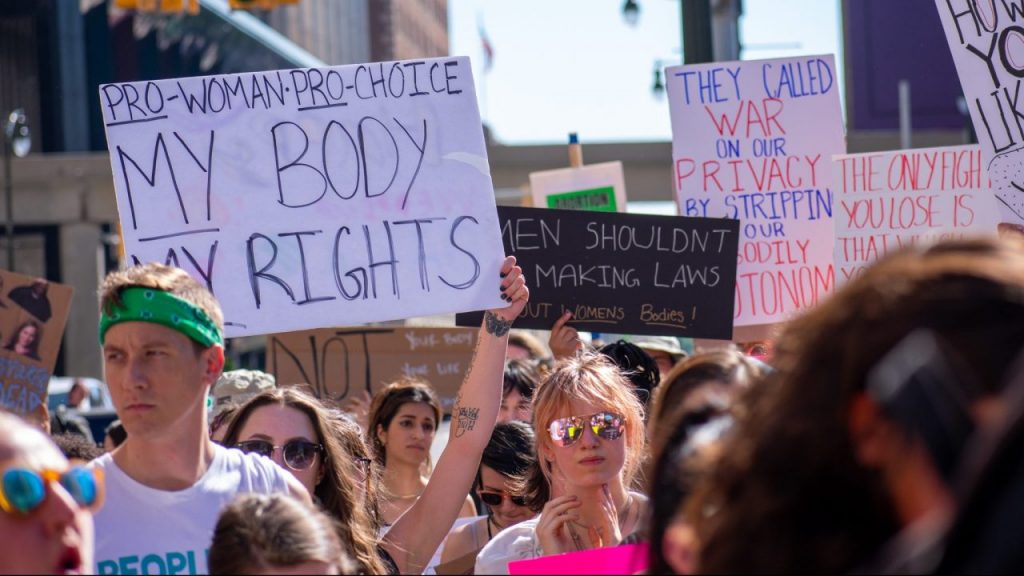Abortion rights drive could help seed future campaigns
The information gleaned from abortion rights and voting rights petitions can be a treasure trove used to create new voter networks, organizer says.

A group of protesters holds up signs during the rally in front of the Theodore Levin United States Courthouse on Friday, June 24, in Detroit.
The Michigan Reproductive Freedom for All campaign turned in petitions this week to put abortion rights into the state Constitution. That’s several hundred thousand registered voters who’ve put their names on paper as supporting the cause. And that support could extend beyond abortion rights and offer some help for Democrats and progressives going into this November’s elections.
The U.S. Supreme Court decision to strike down Roe v. Wade was expected, but was still a gut punch, says Danielle Atkinson of the group Mothering Justice. But, she said, there was a perverse benefit because that’s exactly when the reproductive rights campaign that she’s part of was in the field collecting signatures.
“People were just itching for something to do after Roe was struck down, so it was like something tangible,” she told Michigan Public Radio.
Several thousand people joined as petition circulators. The campaign turned in 753,759 signatures that are being vetted now by state elections officials. The campaign gathered so many signatures that thousands and thousands would have to be disqualified for the question to be denied a spot on the ballot.
Flipping the script
Atkinson is also part of another petition campaign to enshrine voting rights in the state constitution, and both have collected a record number of signatures. She says the information gleaned from those petitions can be a treasure trove used to create new voter networks.
“The smartest way to do it is to mobilize your volunteers in a way that they are talking to their friends and family,” she said. “They’re starting a continuous conversation and that they are collecting names and that you are immediately following up, right?”
That could, in a way, flip the script when it comes to abortion rights campaigns in the state. Right to Life of Michigan and affiliated organizations have over decades effectively used the petition process to enact laws and build local voter networks that elected officials fear and respect. The result has been laws that ban the use of Medicaid funds for abortion, require parental consent in most cases for minors seeking abortions, and demand 24-hour waiting periods.
Republican political consultant Jamie Roe said those measures remain popular with the party base, who are also fired up after the U.S. Supreme Court ruling. And, he said, Republicans also have voter lists.
“I don’t think it’s the end all be all that some people might make it out to be,” he told Michigan Public Radio. “And it is also going to turn out Republicans and it’s going to turn out conservatives. There’s a lot of pro-life people. The state’s pretty equally divided on it.”
And he says Right to Life has played a long game as it’s grown its influence.
Lessons learned

State Sen. Mallory McMorrow (D-Royal Oak) said the abortion rights movement has learned lessons from the campaigns to erode abortion rights. She said petition drives are a form of direct democracy that can inspire voters.
“In a moment when it feels like we are so powerless to do anything, I think so many people who maybe hadn’t been part of the political process realized how powerful they actually are.”
She said that includes people who have felt detached from politics and might be persuaded to turn out, and that could be the game changer over the longer term.
“This is step one in showing people that you have a direct say in this process. You have the ability to change how your government works, what rights you have, what freedoms you have, but also giving people an avenue to keep going.”
Along with ballot questions, control of the Legislature is at stake this year and Gov. Gretchen Whitmer, Attorney General Dana Nessel, and Secretary of State Jocelyn Benson are seeking reelection. All support abortion rights while the yet-to-be officially selected Republican nominees oppose them.
So, the question in 2022 is: Will getting many thousands of people to sign petitions in the summer translate to political clout come November and beyond?
Top image credit: Nate Pappas/WDET
Listen: How support for campaign could extend beyond abortion rights.
Trusted, accurate, up-to-date.
WDET strives to make our journalism accessible to everyone. As a public media institution, we maintain our journalistic integrity through independent support from readers like you. If you value WDET as your source of news, music and conversation, please make a gift today.
